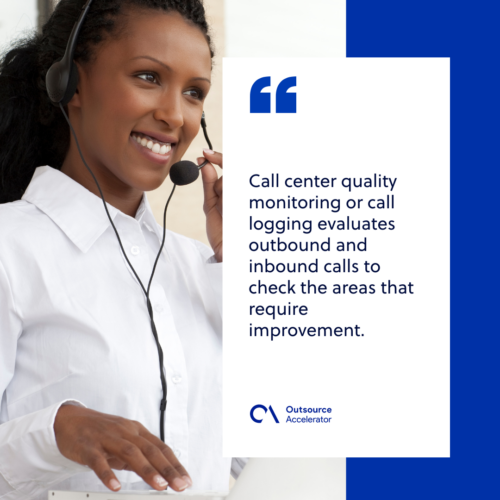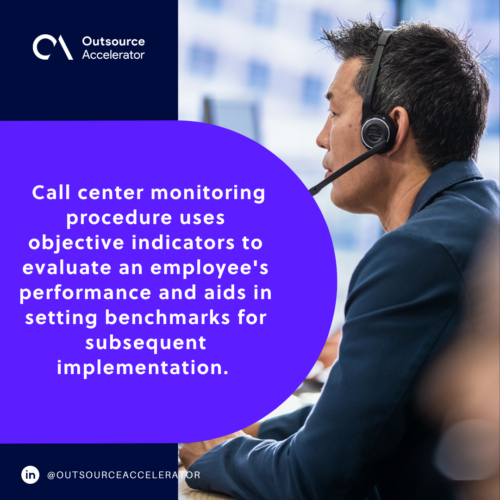A guide to call center quality monitoring

The corporate world has always been known for its high standards regarding working quality. Most jobs, if not all, require KPI (key performance indicator) to evaluate the quality and quantity of work performed monthly or bi-annually.
In the BPO industry, call centers are required to produce quality work since several outbound, and inbound calls occur daily. Customer experience is critical in maintaining a highly reputable call center, so monitoring agent calls is essential.
Call centers need effective quality monitoring to ensure a good customer experience. Learn more about the importance of frequent call center quality monitoring.
What is call monitoring?
Also known as agent monitoring, call center quality monitoring or call logging evaluates outbound and inbound calls to check the areas that require improvement. It also acknowledges best practices that are useful for improving the work process.
Call center monitoring aids in maintaining profitability by streamlining agents’ practices with the company’s top goals.
Quality Assurance (QA) analysts often use a quality assurance form to simplify call evaluation and observe if the customer support representatives follow standard protocols. It helps check if agents understand customer queries and if the offered solutions are the most suitable and appropriate.
A quality assurance form also covers agents’ behavior during the end call, leaving more room for feedback and improvements. The call monitoring form follows the standard call flow. You will find below the following sections included:
- Opening spiel or greeting
- Understanding the customer’s need
- Offering solutions and service
- Closing the call
- Recommendations and observations from the QA analyst

Why is call center quality monitoring beneficial?
Customer satisfaction has a significant role in maintaining excellent, high-quality call center performance. Assessing and evaluating customer interactions makes the customer speak highly of your contact center to other potential clients.
It is also an excellent way to show accurate performance data to an agent. For instance, a sudden rise in call volume can affect a worker’s performance. Positive criticism, on the other hand, can highlight their strengths and motivate them to keep up their performance.
Nevertheless, precise scientific data makes it possible to determine how they are doing.
The call center monitoring procedure uses objective indicators to evaluate an employee’s performance and aids in setting benchmarks for subsequent implementation. This makes it a more trustworthy and reliable technique to determine whether a specific agent is improving.

Why should companies standardize call monitoring?
Every call center company should have a standard process for delivering KPIs. There must be due process for call monitoring to ensure that all agents are appropriately evaluated.
The quality check QA analysts perform during their calls can make or break moments for their work. Thus, this should keep them from demotivating.
Harmony in performance is essential for call center agents as it can also impact customer satisfaction and retention. The more they feel overwhelmed with the number of calls, the more they need to work better.
Clients could give negative feedback that affects the business’s reputation once unfixed.
Creating a call center QA process
Call centers receive significant calls daily from different client partners. It is crucial to follow a systematic approach in evaluating and monitoring them.
A standardized approach to monitoring calls lets businesses streamline their daily process. Aside from that, it helps them measure the improvement, quality, and success of calls accurately.
There are six steps to monitor a call center properly:
Make specific goals
Achieving success doesn’t come easy without setting clear goals. Gathering data will only make sense if the company is aware of its purpose.
That said, be mindful of aligning goals with the company objectives and general practices. It would ensure that you and your team are on the same path and can streamline the process of measuring results from initial ideas.
To be more specific, here are the metrics that you need to collect:
- Business goals (sales targets, growth objectives, brand awareness, etc.)
- Customer needs (reduced wait time, detailed onboarding, etc.)
- Call center compliance requirements
Based on the abovementioned metrics, you can now easily define quality standards for your KPIs.
Specify evaluation standards
Here comes the KPI; track the quality of calls by creating a comprehensive evaluation and scoring form. An easily-measured form often includes sections like greeting, understanding customer needs, ability to offer solutions, quality of customer service, and the manner of the closing segment.
Moreover, a more concrete standard form would include the following:
- Average handle time: Total call duration (hold times, transfers, and after-call work)
- Net promoter score: The rate of customers recommending your product or service to others
- First call resolution: The number of times an agent resolved a complaint in the first call
You can also opt for a 360-degree perspective-taking where the customer, employee, and immediate superior are for your QA process.
Include the right people
Form a QA team to participate in the evaluation process. Managers, agents, and executives will suffice for this stage. These people should be wholeheartedly aware of the company’s requirements and optimize internal processes to reach them.
The QA team will also hold training initiatives and coaching sessions for themselves and call center agents.
Choose calls to monitor
While call monitoring should be a norm for call centers, it is only possible to do it for some people daily. Choose accounts that have the following:
- Had given negative feedback in the past
- Had negative experiences on the team
- Has the potential to upsell
- High-value customers
Alternatively, watch out for workers that are:
- On probation
- Poor performers
- And consistently high-performing agents
Study the data
After data collection, ensure that analysts will easily understand them for it to make sense. A different set of QA analysts can identify patterns, trends, and other observations to acknowledge recurring pain points and improve the process. All in all, this data is crucial for future training purposes.
Make employees a part of the process
The agents play a significant role in this process as data gathered will come from their assignments.
To ensure monitoring plans run smoothly, check if everyone is on board with the process—open room for clarifications, questions, and suggestions to exhibit a harmonious work community.
Additionally, emphasize how enforcing a streamlined call monitoring system benefits all key stakeholders.
How can companies improve quality monitoring in call centers?
An excellent call center is built over time. It requires countless times of improving processes. Agents, customers, executives, and upper management should all be a part of this improvement.
According to Microsoft’s Global State of Consumer Service Report, 90% said that good customer service helps them decide whether to choose and stay loyal to the brand.
This proves that maintaining excellent customer service is a huge responsibility, making it crucial to improve quality monitoring continuously.
Knowing this leaves the agent-customer interaction at a high stake. Fortunately, your brand can consistently monitor call center quality in several ways.

Monitor all communication channels
Some companies may have omnichannel support that requires consistent monitoring. Email, live chat, SMS, and phone are common channels customer support uses.
Do a quality check on how agents interact with customers from time to time to see how they perform. It allows you to see if inconsistencies can affect their call quality. Once you identify if there are any disparities, you can easily coach and leverage them accordingly.
Do coaching
Developing a coaching culture in the company is a good practice since it cultivates healthy communication within the team. Ensure that every session is constructive to avoid miscommunication.
Allow the people to speak their minds and watch employee engagement improve over time. Moreover, it can help increase talent retention and progress your business outputs.
Allow agents to take part in creating a QA checklist
Involving agents in creating the checklist means you are giving them ownership too. Fair enough, since they play a considerable role in the process.
Curating the checklist together makes agents feel at ease working since they won’t have this sense of being micromanaged. More importantly, it fosters a positive and team-centered workplace.
Practice motivation and give rewards
There’s nothing better than receiving a good word from your boss. The same goes for agents; motivating them will help boost their work performance. You will be surprised how well their calls are doing when you lift their spirits through motivation.
It is okay to reinforce rewards too! Public acknowledgment or a bonus will surely increase their willingness to work better. To proactively direct and encourage agents to perform better in vital areas, you can weigh the quality criterion you think is most relevant with more points.
Present real-time statistics to the team
Full transparency is essential to the team as it builds trust.
Disclosing real-time stats like how calls went for the past week allows them to evaluate their selves. It shows how the company gives fair evaluations to everyone and gives ownership to their role.
Seeing their performance rate will help them perform better and increase progressive outputs.
Call center quality monitoring as a norm for the BPO industry
Consistent monitoring is crucial in any work as it is the benchmark on how a company will most likely be.
For call centers, ensuring high-quality work from agents is a must. Their monthly and annual evaluation is a make or break for their career since they constantly communicate with customers.
While the BPO industry has fully adopted the KPI system since then, they are responsible for making it fair and consistent for all agents. All evaluations must reflect how a company treats its workers. It should not be a source of demotivation but a motivation instead.
With that said, call centers must promote quality monitoring that creates a harmonious work environment for every part of the team.







 Independent
Independent




